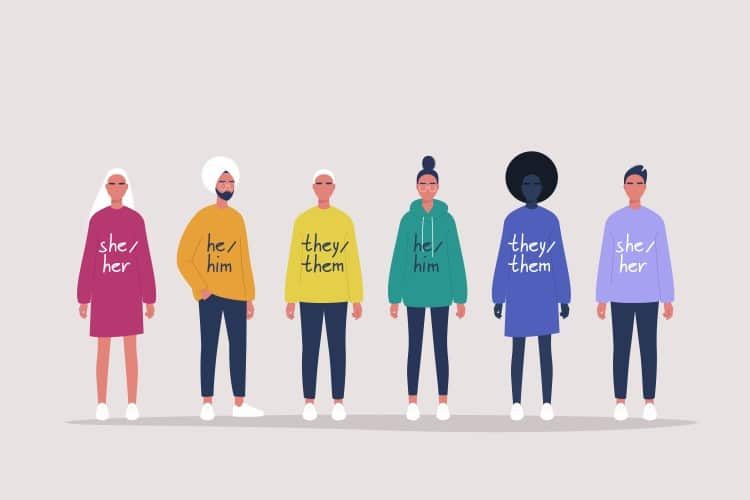
We may assume that being punished for failing to “be kind to each other and not call each other names” was left behind in fourth grade. But mother of two Kate Scottow found out differently, the hard way, when she was arrested for “making use of a public electronic communications network to cause annoyance, inconvenience or needless anxiety to another.” (Needful anxiety is, presumably, a different matter.)
But the charges against Scottow, a 39-year-old Briton, have now been vacated by England’s High Court. As Breitbart reports:
Scottow had been convicted under a section of the Communications Act which makes “persistently making use of a public electronic communications network to cause annoyance, inconvenience or needless anxiety to another” a crime following an argument with lawyer and trans activist Stephanie Hayden, who is legally a woman according to a gender certificate obtained in 2017.
District judge Margaret Dodds decided that Mrs Scottow had broken the “rule’” to “be kind to each other and not call each other names”, but Lord Justice Bean and Mr Justice Warby at the Divisional Court of the High Court overturned her judgement as “deficient” and “flawed” on appeal.
“The Judge appears to have considered that a criminal conviction was merited for acts of unkindness and calling others names,” said Mr Justice Warby, but “A prosecution under section 127(2)c [of the Communications Act] for online speech is plainly an interference by the state with the defendant’s Convention right to freedom of expression.”
The senior judges said that if the case had “been approached by the [original] Judge in a legally correct manner, it should have been dismissed”.
But the whole case was approached in a tyrannical manner, with Scottow having been “arrested in December 2018 at her home in front of her then ten-year-old daughter and 20-month-old son,” the Daily Mail informs.
Hayden had alleged that “Scottow had sent tweets referring to her [sic] as ‘he’ or ‘him’ during a period of ‘significant online abuse,’” the paper continued (note: You can block people on Twitter). “Mrs Scottow had referred to Miss [sic] Hayden online as ‘a pig in a wig’ and had labelled her [sic] a racist from an account under the name ‘Busted Wench’.”
Of course, if everyone hurling the pejorative “racist” were arrested, our whole Democratic Party could be in prison; moreover, if being unkind and name-calling in general were actionable, most of the rest of the population would join them.
So one may wonder, does Judge Dodds have any idea what transpires online?
Here’s a clue, Your Honor: Left-wing activists are often vicious, as I illustrated in my October essay “Violence, Inc.: A Leftist Enterprise.” MUSS (Made-up Sexual Status) activists can be especially hostile, as I learned firsthand after criticizing their agenda — one wanted my “head on a platter.”
Then there’s how MUSS individual “Zoey Tur” angrily threatened commentator Ben Shapiro during a 2015 TV appearance (not ladylike at all! Video below).
Of course, though, eliminating “hate,” an impossibility this side of Heaven, isn’t really “hate speech” laws’ purpose. Instead, the aim is to quash what the Left hates — and this changes with the wind.
This is why it’s a mistake to, in an effort to stigmatize speech laws, compare them to heresy prohibitions of old.
Say what you will about the latter, they were instituted by people who believed in Truth (absolute and universal by definition) and thus were quite well defined. But since today’s Thought Police are relativists, it’s not just that one man’s hate should be another’s love in their way of “thinking” (read: feeling).
It’s that today’s hate was often yesterday’s speech mandate. Supreme Court Justice Amy Coney Barrett found this out during her confirmation hearings when leftist Senator Mazie Hirono (D-Hawaii) scored her for using the term “sexual preference” — which had been used during the previous several weeks by leftists themselves.
But these realities don’t at all deter authorities in Britain (and elsewhere) from enforcing hate-speech laws, even as crime skyrockets in the United Kingdom, as the tweets below evidence.
Of course, whether enforced by governmental or just social law, every civilization has, and has had, its speech codes. For example, Socrates was forced to drink the hemlock partially for, the allegations went, corrupting the young and “mocking the gods.” During the Second Sophistic period in Rome, Latin rhetorical studies were banned in favor of Greek rhetorical studies. Miron Wolffson, a professor at Moscow University, was expelled from the institution in 1932 for teaching Menshevik ideas. Mathematician William Whiston lost his professorship at the University of Cambridge for taking anti-Trinitarian positions. And some nations, such as Colombia, banned the teaching of utilitarian philosophy in universities in the 19th century.
What will be stigmatized, however, depends on what’s valued, as stigmas are the corollaries of values. For if we value things — such as honesty, diligence, and courage — it follows that their opposites will be devalued.
The difference is that in a healthy civilization, it’s more often that the Truth is valued and lies stigmatized (whether or not this is reflected in state law). Increasingly in our time, it’s the reverse — and the drumbeat to turn lies into law is fierce. Hence the desire to punish those acknowledging reality; for instance, that a man in counterfeit garb is still a man.
This is tragic because as with a person, a civilization that pathologically lies to itself is poised for destruction.


